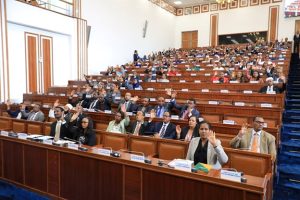
Many scholars wrote that Ethiopian revolutions or political dissidences in the history of the country are more or less linked to political movements of higher learning institutions.
Indeed, almost all of them in the past sprung out of colleges, soon to be spread to lower level schools until they reach the general public. While that sounds good, the struggles and the sacrifices in the past were for the noble causes of the general public.
The causes of their struggles were the wellbeing of farmers; equality of nations, nationalities as well as equality of religions. Their sacrifices were meant for freedom of political organization and expression; for the establishment of democratically elected government. Students rebelled against governments not for other causes than the prevalence of democracy, development, equality and fairness.
The other good quality of those student activists in the past was that almost all of their struggles were peaceful. That was the case even at a time of brutal, repressive and deadly and at times barbaric reactions from the government.
The recent ground-breaking changes and the reform underway had also been partly spearheaded by consistent disobedience of students and teachers of higher learning institutions. Many of them have sacrificed their lives for the current changes to come true.
Even after major changes introduced to the country, we are yet far from stopping violence, particularly in some college compounds. The saddest thing is that the violent actions taking place in the name of protest are not the kinds of public disobedience for noble causes like those in the past. They appear to claim for ethnic-based demands but they fail to represent the specific people they claim to be champions.
Their so called oppositions, be it political or administrative, are usually accompanied by killings of their fellow citizens, destroying public and private properties and disruption of their golden time to learn and study. Above all, they tend to ignite discord, mistrust, and hatred among long-standing unity of the Ethiopian peoples.
With the kind of situation we are witnessing, we need to ask what went wrong with those “learned people”. We need to check the kind of mind-set prevailing among the students who are supposed to lead the posterity. How on earth a certain college student, who went to the campus due to his or her good academic performance with the ultimate aim of changing the life his people ended up in killing his fellow student. How could one justify such ethnically motivated violence taking place within a compound deemed to represent the little Ethiopia?
The thing is that those institutions might be below our expectations.
They are there first and foremost to produce rational and civilized people. They are supposed to be center of excellence, rational and critical thinking. They are established to incubate problem-solving minds and not the other way round. They should not be mentors of egocentric, ethnocentric, machete-wielding warmongers and murderers.
For this reason, the academia should first and foremost ask themselves as to what went wrong with their teachings. And then, they need to put it right. By doing so, they should prove that they are worthy of their names; that they are truly institutions of higher caliber, fountain of new ideas, philosophies and problem-solving minds. And that can be proven by the reflections of their students. The proof of the pudding is in the eating.
The Ethiopian Herald, December 7/2018





